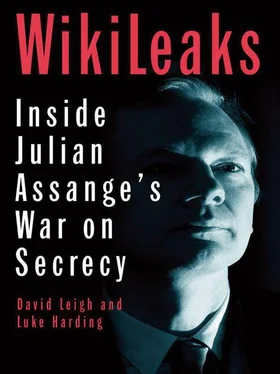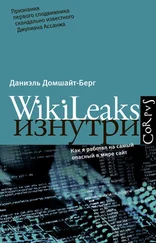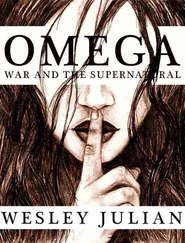Harding, Luke - WikiLeaks - Inside Julian Assange's War on Secrecy
Здесь есть возможность читать онлайн «Harding, Luke - WikiLeaks - Inside Julian Assange's War on Secrecy» весь текст электронной книги совершенно бесплатно (целиком полную версию без сокращений). В некоторых случаях можно слушать аудио, скачать через торрент в формате fb2 и присутствует краткое содержание. Жанр: Старинная литература, на английском языке. Описание произведения, (предисловие) а так же отзывы посетителей доступны на портале библиотеки ЛибКат.
- Название:WikiLeaks: Inside Julian Assange's War on Secrecy
- Автор:
- Жанр:
- Год:неизвестен
- ISBN:нет данных
- Рейтинг книги:3 / 5. Голосов: 1
-
Избранное:Добавить в избранное
- Отзывы:
-
Ваша оценка:
- 60
- 1
- 2
- 3
- 4
- 5
WikiLeaks: Inside Julian Assange's War on Secrecy: краткое содержание, описание и аннотация
Предлагаем к чтению аннотацию, описание, краткое содержание или предисловие (зависит от того, что написал сам автор книги «WikiLeaks: Inside Julian Assange's War on Secrecy»). Если вы не нашли необходимую информацию о книге — напишите в комментариях, мы постараемся отыскать её.
WikiLeaks: Inside Julian Assange's War on Secrecy — читать онлайн бесплатно полную книгу (весь текст) целиком
Ниже представлен текст книги, разбитый по страницам. Система сохранения места последней прочитанной страницы, позволяет с удобством читать онлайн бесплатно книгу «WikiLeaks: Inside Julian Assange's War on Secrecy», без необходимости каждый раз заново искать на чём Вы остановились. Поставьте закладку, и сможете в любой момент перейти на страницу, на которой закончили чтение.
Интервал:
Закладка:
In the seven months he spent at the Contingency Operating Station Hammer in Iraq, there was one seminal moment that appears to have ignited Manning’s anger. A dispute had arisen concerning 15 Iraqi detainees held by the national Iraqi police force on the grounds that they had been printing “anti-Iraqi literature”. The police were refusing to work with the US forces over the matter, and Manning’s job was to investigate and find out who the “bad guys” were. He got hold of the leaflet that the detained men were distributing and had it translated into English. He was astonished to find that it was in fact a scholarly critique against the Iraqi prime minister, Nouri al-Maliki, that tracked the corruption rife within his cabinet.
“I immediately took that information and ran to the officer to explain what was going on,” Manning later explained. “He didn’t want to hear any of it … He told me to shut up and explain how we could assist the [Iraqi] police in finding MORE detainees.”
Manning noted that, thereafter, “everything started slipping … I saw things differently … I had always questioned the [way] things worked, and investigated to find the truth … but that was a point where I was a part of something, actively involved in something that I was completely against.”
Slowly, surely, Manning began edging his way towards a position that many have denounced as traitorous and abhorrent, and others have praised as courageous and heroic. He was starting to think about mining the secret databases to which he had access, and dumping them spectacularly into the public domain. “It’s important that it gets out … I feel for some bizarre reason,” he said. “It might actually change something.”
But first he needed a conduit, a secure pipe down which he could transmit the information that he had copied on to CDs labelled Lady Gaga. As he contemplated what route to use, his eye was caught by an exercise run by WikiLeaks on Thanksgiving 2009, about a month into his tour of duty in Iraq. Over a 24-hour period, WikiLeaks published a stream of more than 500,000 pager messages that had been intercepted on the day of the September 11 2001 attacks on New York and Washington in the order in which they had been sent. It provided an extraordinary picture of an extraordinary day. Manning was even more impressed, because with his specialist knowledge he knew that WikiLeaks must have somehow obtained the messages anonymously from a National Security Agency database. And that made him feel comfortable that he, too, could come forward to WikiLeaks without fear of being identified.
His search for a vessel through which to unload his mountain of top-secret material had succeeded. Within days of the WikiLeaks 9/11 spectacular, Manning took the first big step. He made contact with a man whom he described as “a crazy white-haired Aussie who can’t seem to stay in one country very long”. The game was on with Julian Assange.
CHAPTER 3
Julian Assange
Melbourne, Australia
December 2006
“ Give him a mask, and he will tell you the truth ”
OSCAR WILDE
The unusual Australian who wrote up his dating profile for the OKCupid website used the name ‘Harry Harrison’. He was 36 years old, 6ft 2ins tall and, said the site’s test, “87% slut.” He began:
“WARNING: Want a regular, down to earth guy? Keep moving. I am not the droid you are looking for. Save us both while you still can. Passionate, and often pig headed activist intellectual seeks siren for love affair, children and occasional criminal conspiracy. Such a woman should be spirited and playful, of high intelligence, though not necessarily formally educated, have spunk, class & inner strength and be able to think strategically about the world and the people she cares about.
“I like women from countries that have sustained political turmoil. Western culture seems to forge women that are valueless and inane. OK. Not only women!
“Although I am pretty intellectually and physically pugnacious I am very protective of women and children.
“I am DANGER, ACHTUNG, and ??????????????!”
“Harry” went on to say he was directing a “consuming, dangerous, human rights project which is, as you might expect, male dominated”. He also suffered from “Asian teengirl stalkers”. The question what “could [he] never do without” produced the answer, “I could adapt to anything except the loss of female company and carbon.” The profile warned: “Do not write to me if you are timid. I am too busy. Write to me if you are brave.”
Harry’s stated activities were extraordinary. He described himself as “variously professionally involved in international journalism/books, documentaries, cryptography, intelligence activities, civil rights, political activism, white collar crime and the internet”. His gallery of photographs showed a man with pale skin, sharp features and wind-blown silver-grey hair. In some he has a half-smile, in others he stares down the barrel of the camera.
Harry Harrison was a pseudonym, and the person behind the mask was Julian Assange, a computer hacker living in a crowded student house in Melbourne, dreaming up a scheme for an idealistic information insurgency which was eventually to become celebrated – and execrated – worldwide as WikiLeaks. Assange had a striking and, some critics would say, damaged personality. It was on peacock display in this dating profile, but probably rooted deep in his Australian childhood and youth.
His obsession with computers, and his compulsion to keep moving, both seemed to have origins in his restless early years. So too, perhaps, did the rumblings from others that Assange was somewhere on the autistic spectrum. Assange would himself joke, when asked if he was autistic: “Aren’t all men?” His dry sense of humour made him attractive – perhaps too attractive – to women. And there was his high analytical intelligence. In a different incarnation, Assange could perhaps have been the successful chief executive of a major corporation.
There were a few demerits OKCupid couldn’t capture. Assange’s social skills sometimes seemed lacking. The way his eyes flickered around the room was curious; one Guardian journalist described it as “toggling”. And occasionally he forgot to wash. Collaborators who fell out with him – there was to be a long list – accused him of imperiousness and a callous disregard for those of whom he disapproved. Certainly, when crossed, Assange could get very angry indeed, his mood changing as if a switch had been flicked. But in one way the OKCupid profile, last modified in 2006, proved in the end to be dizzyingly accurate. Four years later, in 2010, nobody would be left in any doubt that Assange really did mean, DANGER, ACHTUNG!
Julian was born on 3 July 1971 in Townsville, in the state of Queensland, in Australia’s sub-tropical north. His mother Christine was the daughter of Warren Hawkins, described by colleagues as a rigid and traditionalist academic who became a college principal; the family settled in Australia from 19th-century Scotland. Julian’s biological father is absent from much of the record: at 17, Christine abruptly left home, selling her paintings to buy a motorcycle, a tent and a map. Some 1,500 miles later she arrived in Sydney and joined its counter-culture scene. According to the book Underground , a revealing docu-novel to which Assange contributed, his mother worked as an artist and fell in love with a rebellious young man she met at an anti-Vietnam war demonstration in 1970. He fathered Julian. But the relationship ended and he would apparently play no further role in Assange’s life for many years. They had no contact until after Assange turned 25.
His father was not forgotten, though. In 2006, at the start of Julian’s remarkable mission to uncover secrets, he registered the wikileaks.org domain name under what is, according to court records, his biological father’s identity – John Shipton. After the birth of her child, Christine moved as a single mother to Magnetic Island, a short ferry ride across the bay from Townsville. Magnetic Island was primitive and bohemian. Its small population included hippies who slept on beaches and in rock caves. The local kids would fish, swim, and play cricket with coconuts. There were koalas, possums, and giant clams. The Great Barrier Reef was nearby, and the islanders were eco-pioneers who grew their own vegetables and helped themselves to what was in the sea – fish, prawns, crabs and crayfish.
Читать дальшеИнтервал:
Закладка:
Похожие книги на «WikiLeaks: Inside Julian Assange's War on Secrecy»
Представляем Вашему вниманию похожие книги на «WikiLeaks: Inside Julian Assange's War on Secrecy» списком для выбора. Мы отобрали схожую по названию и смыслу литературу в надежде предоставить читателям больше вариантов отыскать новые, интересные, ещё непрочитанные произведения.
Обсуждение, отзывы о книге «WikiLeaks: Inside Julian Assange's War on Secrecy» и просто собственные мнения читателей. Оставьте ваши комментарии, напишите, что Вы думаете о произведении, его смысле или главных героях. Укажите что конкретно понравилось, а что нет, и почему Вы так считаете.












